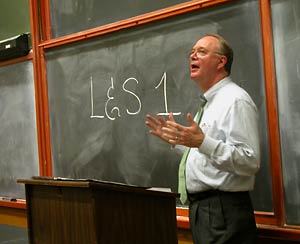 Het is met Martin Simek het een of het ander, zo lijkt het wel. Of hij heeft zo'n goede gast, dat daarom de podcast goed is. Of hij heeft een of andere vage figuur over de vloer, maar veert op met scherp interviewen en weet er daarom een goede uitzending van te maken. Zo vond ik Paul Gelderloos (audio) niet erg imponerend, maar Simek pluisde heel nauwkeurig Gelderloos' ontwikkeling na van tobbende puber, via teleurgestelde psychologiestudent, tot succesvolle ondernemer en vooraanstaande TM activist. Dat is wat een interviewprogramma de moeite waard maakt.
Het is met Martin Simek het een of het ander, zo lijkt het wel. Of hij heeft zo'n goede gast, dat daarom de podcast goed is. Of hij heeft een of andere vage figuur over de vloer, maar veert op met scherp interviewen en weet er daarom een goede uitzending van te maken. Zo vond ik Paul Gelderloos (audio) niet erg imponerend, maar Simek pluisde heel nauwkeurig Gelderloos' ontwikkeling na van tobbende puber, via teleurgestelde psychologiestudent, tot succesvolle ondernemer en vooraanstaande TM activist. Dat is wat een interviewprogramma de moeite waard maakt.Simek heeft wel een zekere affiniteit met alternaitieve en spiritualistische gasten, zoals we vooral duidelijk merkten bij zijn bezoek aan de bejaarde Maria Sickesz en het is merkbaar dat hij behoorlijk onder de indruk van Gelderloos is. Deze keer echter laat hij zich niet in slaap sussen door zijn eigen geimponeerdheid en pint zijn gast vast om het verhaal nauwkeurig te vertellen, wat soms een amechtig, ontwapenend bedoeld, lachen oproept, maar Simek laat niet los.
Zo krijgen we het hele verhaal, inclusief, tussen de regels door, dat Gelderloos zichzelf niet als verlicht ziet (al zou het nooit over zichzelf zeggen als hij het was. Hint?) en gescheiden en hertrouwd is. Bijna was hij bij zijn kolonel van de militaire dienst gebleven, als de Maharishi hem niet naar Zwitserland had gehaald. Ondernemer is hij trouwens ook alleen maar geworden om te bewijzen dat transcendente meditatie hem succesvol zou maken. Hij is succesvol (maar komt dat door TM?), voor hem is het bewezen, en toch gaat hij door. Simek laat ruimte voor ironie en scepsis en tegelijk ook voor waardering.
Meer Simek op dit blog:
Bas Heijne,
Herman Finkers,
Tijs Goldschmidt,
Truus Menger,
Eva Maria Staal.
Binnenkort: Olaf Tempelman.




